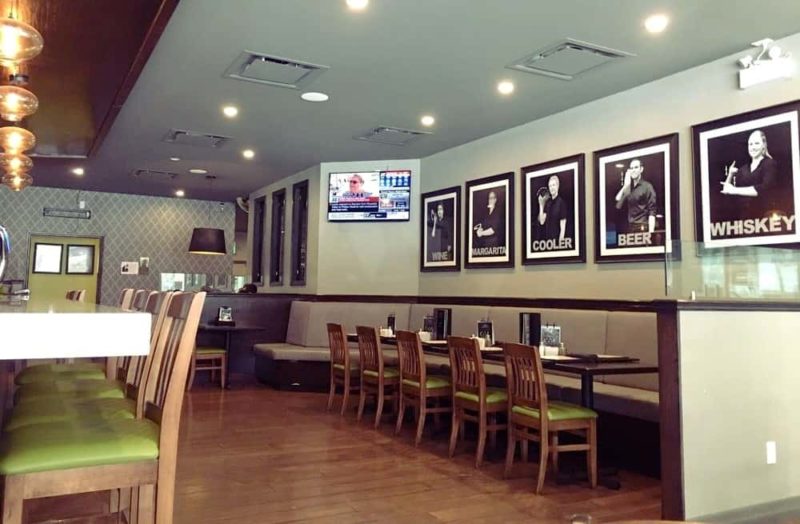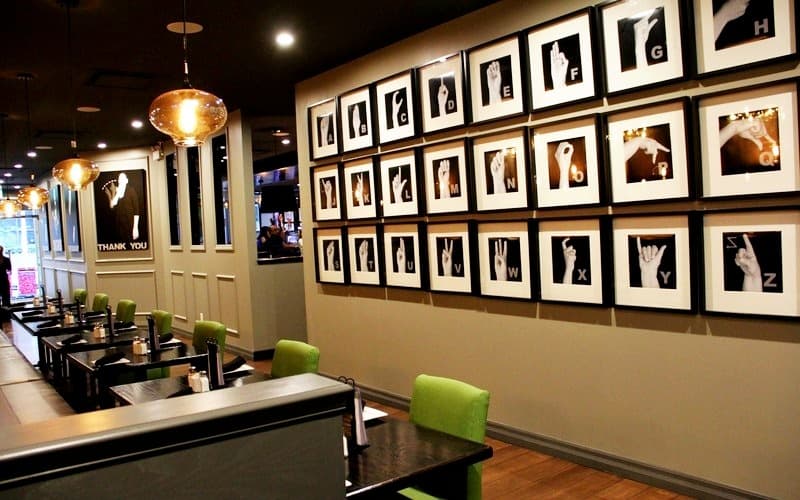
Many restaurants create interest in their potential customer base by providing something of value or unique. Toronto’s Signs Restaurant, which opened in July 2014, was a Canadian business that did just that. Signs Restaurant was dedicated to serving deaf members of society while being open to everyone, creating an inclusive dining experience. This approach not only attracted a diverse range of customers but also fostered a strong sense of community and loyalty. This sense of inclusivity and shared experiences extends beyond dining, as seen in the community-driven engagement offered by Canada’s top online casinos and online slots.
Community Spaces for Dining and Online Gambling Entertainment
Community-driven spaces like Signs Restaurant foster connection and shared experiences, creating a welcoming environment for all. Similarly, online platforms in Canada bring people together through interactive features such as live dealer games, chat options, and thrilling slot games. For those drawn to the best online slots Ontario, checking the top digital pastimes reveals how these games offer both entertainment and opportunities for meaningful interaction. Online slot tournaments further enhance this sense of community, allowing players to compete and connect in dynamic and engaging ways. This blend of entertainment and camaraderie mirrors the inclusivity and engagement that made physical spaces like Signs so memorable, demonstrating how virtual platforms can cultivate a shared sense of connection.
Engaging Communities: Lessons from Signs Restaurant and Beyond
Community engagement is crucial for restaurants like Signs. These establishments build lasting relationships with their patrons by addressing specific needs and fostering an inclusive environment. This principle of community engagement applies well to other industries, including online gambling.
Signs Restaurant Toronto permanently closed down in 2016.
Other restaurants nearby include:
The Signs Restaurant has been a favourite meeting place for players from this famous online casino in Canada. In this restaurant, they not only discussed their experiences and enjoyment of the variety of games but also chatted on personal topics like good old friends.
Location

Before the closing of Signs Restaurant in 2016, it was easy to find at the intersection of Wellesley Street and Yonge Street in the downtown district of Toronto. The exact location and address were 558 Yonge Street, Toronto, ON M4Y 1Z1. This gave the restaurant a prime position in the financial district of central Toronto, to attract the widest range of customers. It could also be noticed in clear pictures and images. The nearest subway station was Wellesley.
Signs Restaurant menu
Signs Restaurant was not just a special place for those with hearing disabilities, but also a full-service restaurant and bar that provided for all customers. The menu offered a range of contemporary American and Canadian food, such as burgers and poutines. In addition to this, there was an interesting blend of international foods to reflect Canada’s multicultural society. Menu items included:
- Appetizers: Korean BBQ wings, taro chips, and guacamole, deep-fried mac and cheese bites, sesame sticky rice cakes, chili lime shrimp, broiled mushroom caps.
- Poutines: Pork belly poutine, butter chicken poutine, duck belly poutine, bacon, sour cream, and scallions poutine.
- Salads: Caesar salad, Mediterranean salad, watermelon quinoa jicama salad.
- Sandwiches: Veggie burger, grilled chicken panini, pork belly bahn mi.
- Mains: Butternut squash ravioli, vegan zucchini rolls, pad Thai, NY steak and fries, miso salmon, chicken breast with tomato curry and basmati rice.
- Dessert: Cheesecake, fudge brown sundae, lemon berry trifle, strawberry dacquoise.

This also came with a wide selection of add-ons so meals could be conveniently adapted to suit the preferences of each diner. These included cheese, avocado, bacon or mushroom add-ons for sandwiches, with chicken or shrimp to add to salads or mains.
As well as providing for customers with disabilities, Signs Restaurant also made special efforts for those with dietary requirements. This included particular allergies, gluten or dairy intolerance, or the need to have food pureed.
The restaurant had an entryway ramp with braille, and wide double doors to improve accessibility. In 2015, an exception was made by the city council to allow the ramp to be used without the necessary permit. The nearest accessible subway station is Bloor-Yonge, as Wellesley is not accessible.
Concept

What made Signs Restaurant different to most other dining options was that it was staffed by deaf servers. The name ‘Signs’ was a reference to making use of the American Sign Language (ASL). However, customers were not expected to be proficient in ASL. Instead, they could make use of images that gave directions on how to order in ASL.
While for deaf customers this provided an uncommon convenience, for hearing customers it is an inclusive learning experience to benefit those with disabilities. Customers also had the option to point to a “cheat sheet” of pictures if communication proved too challenging.
Anjan Manikumar is the restaurant’s founder, with 10 years of experience in the food industry and an MBA. The idea came to him while working as a waiter and noticing the difficulty of ordering for a deaf customer.
Employment is another challenge within the deaf community, as the most recent figures showed that 37.5 percent of Canada’s deaf population is unemployed. This issue Manikumar tried to address by hiring staff members that were mainly deaf – 37 of his 50 employees had hearing difficulties.
Signs comes as part of a new wave of deaf restaurants around the world, though it is the first of its kind in Canada. Others include Crepe Crazy, which opened in Austin in 2007, a pizza restaurant in San Francisco named Mozzeria, and four signing Starbucks branches around the world.
Signs Restaurant reviews
In reviews, Signs Restaurant had an overwhelmingly positive reception. Most customers have both enjoyed the food and drinks, as well as the overall experience. The accumulated rating on TripAdvisor was 4.5. All-round praise has been given for a unique learning opportunity.
The staff are warm and friendly and make you feel comfortable trying to communicate in a new way.
Daniel from Toronto
But far from being solely about the restaurant’s concept, reviews of the food, service, and atmosphere have also been good.
A lovely meal in a nice ambiance.
Jo from England
While Herbert from Connecticut said his group of 10 ‘all enjoyed the dining, the learning, and the camaraderie’.
Signs Restaurant and bar provided an inclusive dining experience for Toronto residents and visitors that for many were also educational, before its closing. This kind of initiative should be encouraged in entrepreneurs who wish to make a positive change to the world, as well as run a functional business.